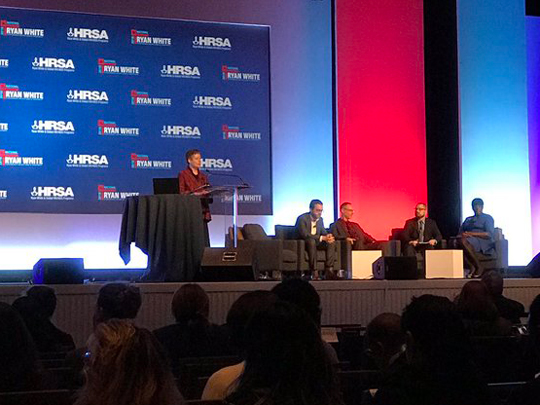Day 2 Highlights: 2018 National Ryan White Conference on HIV Care & Treatment

Thousands of HIV care and treatment leaders, including HRSA Ryan White HIV/AIDS Program (RWHAP) recipients and subrecipients from across the country, reconvened for day two of the 2018 National Ryan White Conference on HIV Care & Treatment on Wednesday. At the morning plenary session, panelists highlighted how Ryan White HIV/AIDS Program recipients, jurisdictions, people living with HIV, and subject matter experts leverage innovation and data to inform resource planning and service delivery system changes in order to address health disparities for populations not adequately engaged in HIV care and treatment.
Session Spotlights Advancing Innovation and Leveraging Data
Heather Hauck, Deputy Associate Administrator of HRSA's HIV/AIDS Bureau, drilled down on 2017 Ryan White HIV/AIDS Program client-level data from the report [PDF, 3.8MB] released Tuesday. She highlighted that HRSA's Ryan White HIV/AIDS Program is key to ending the HIV epidemic because the data show that "when a person living with HIV walks in your doors, into our programs, into your services – 85.9 percent achieve viral suppression." Hauck continued that if the program could reach each person not in care and get them into the RWHAP system, "we would get to a day with all people living with HIV living longer and healthier lives with few to no transmissions—but to get there, we have to think differently, plan differently, and implement differently."
Kyle Foreman, Director of Data Science, Institute for Health Metrics & Evaluation, University of Washington, presented an overview of data visualization, the graphic depiction of information to more readily convey its meaning, and provided tips on its use with RWHAP HIV data. Foreman shared tips for getting started on data visualization, including engaging a broad audience of stakeholders to design the effort and using free online data utilization tools.
Tom Williams, Project Manager/Finance, Ryan White HIV/AIDS Program Part A, City of Hartford, CT, explained how the Transitional Grant Area (TGA) uses data to find and link Hepatitis C (HCV) and HIV co-infected patients to care. Williams shared that the city's HCV and HIV data innovations have included data migration to CAREWare and enhanced HCV data collection. He highlighted the program's lessons learned: keep performance measures simple and adaptable, bridge electronic medical records (EMR) and CAREWare systems to enhance service delivery, keep consumers informed via the planning council, and track those at risk of re-infection.
Camden Hallmark, Senior Analyst for the Houston Health Department, outlined efforts in the Houston RWHAP Part A Eligible Metropolitan Area (EMA) to use data to enhance the region's response to HIV. Hallmark focused his remarks on Molecular HIV Surveillance, which examines genetic sequences to track characteristics of new infections. However, he also spoke about the importance of collaboration and engaging the communities you work alongside, stating "the sooner you can engage communities, the better – it's important to have those dialogues."
Kneeshe Parkinson, Community Health Navigator/Missouri State at the RWHAP-funded Project ARK at Washington University in St. Louis, described her experience with data as an individual living with HIV. Parkinson learned she was HIV positive at age 17. Since receiving that piece of information, she has become an advocate for people living with HIV, and for 20 years, she has assisted women in getting into care, keeping appointments, getting transportation, and providing health education. Parkinson closed with advice to those who are newly diagnosed: seek clarity of mind with your new diagnosis, find a support group, and decide for yourself if and how you disclose your HIV status.
Stay Connected to #RyanWhite2018
Want to stay connected to the 2018 National Ryan White Conference on HIV Care & Treatment? Follow us on Twitter: @HRSAgovExit Disclaimer.
You can also stay up-to-date on the latest conference happenings on HRSA's Facebook pageExit Disclaimer and catch conference highlights on HIV.gov's Facebook Live.Exit Disclaimer